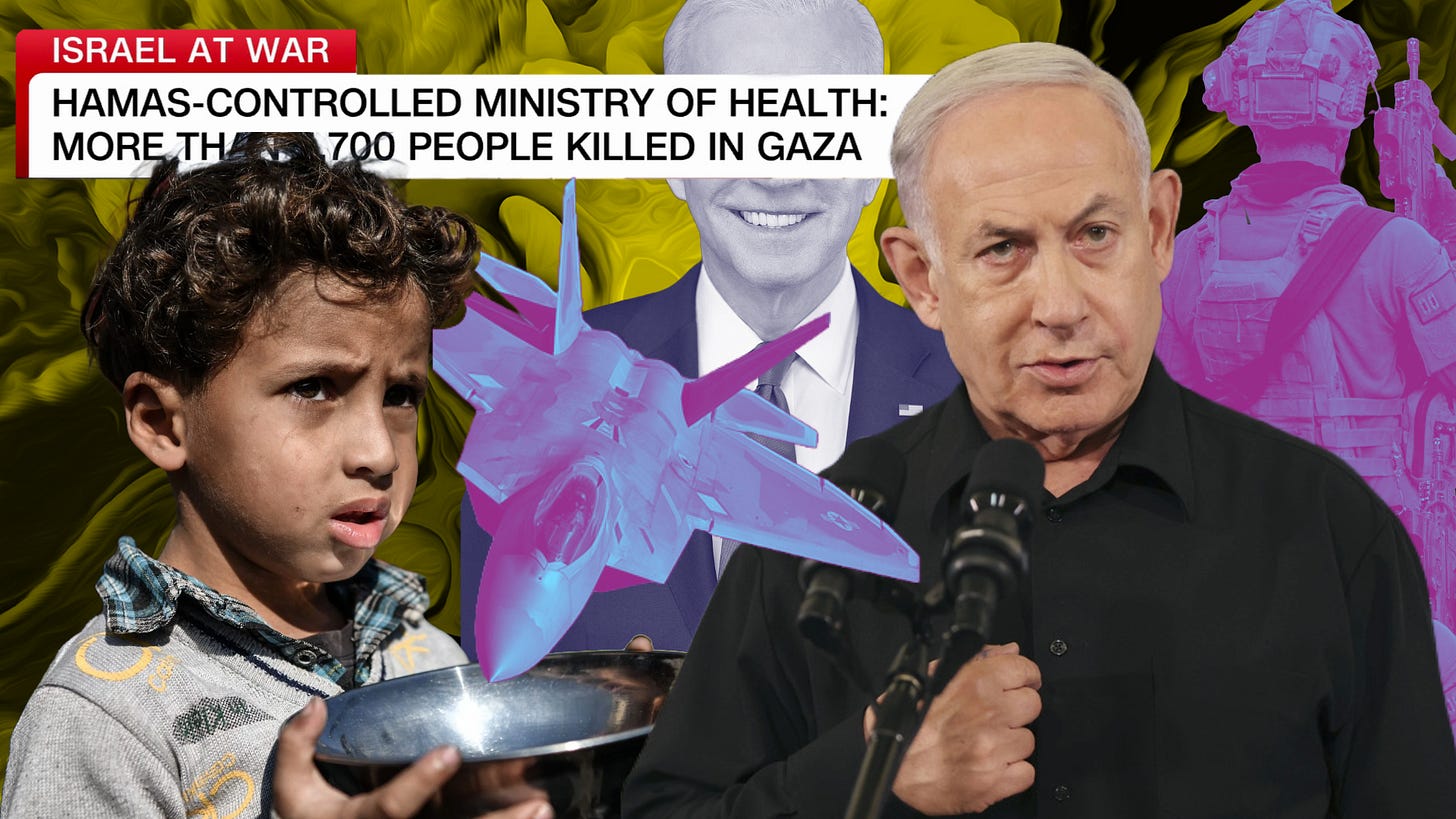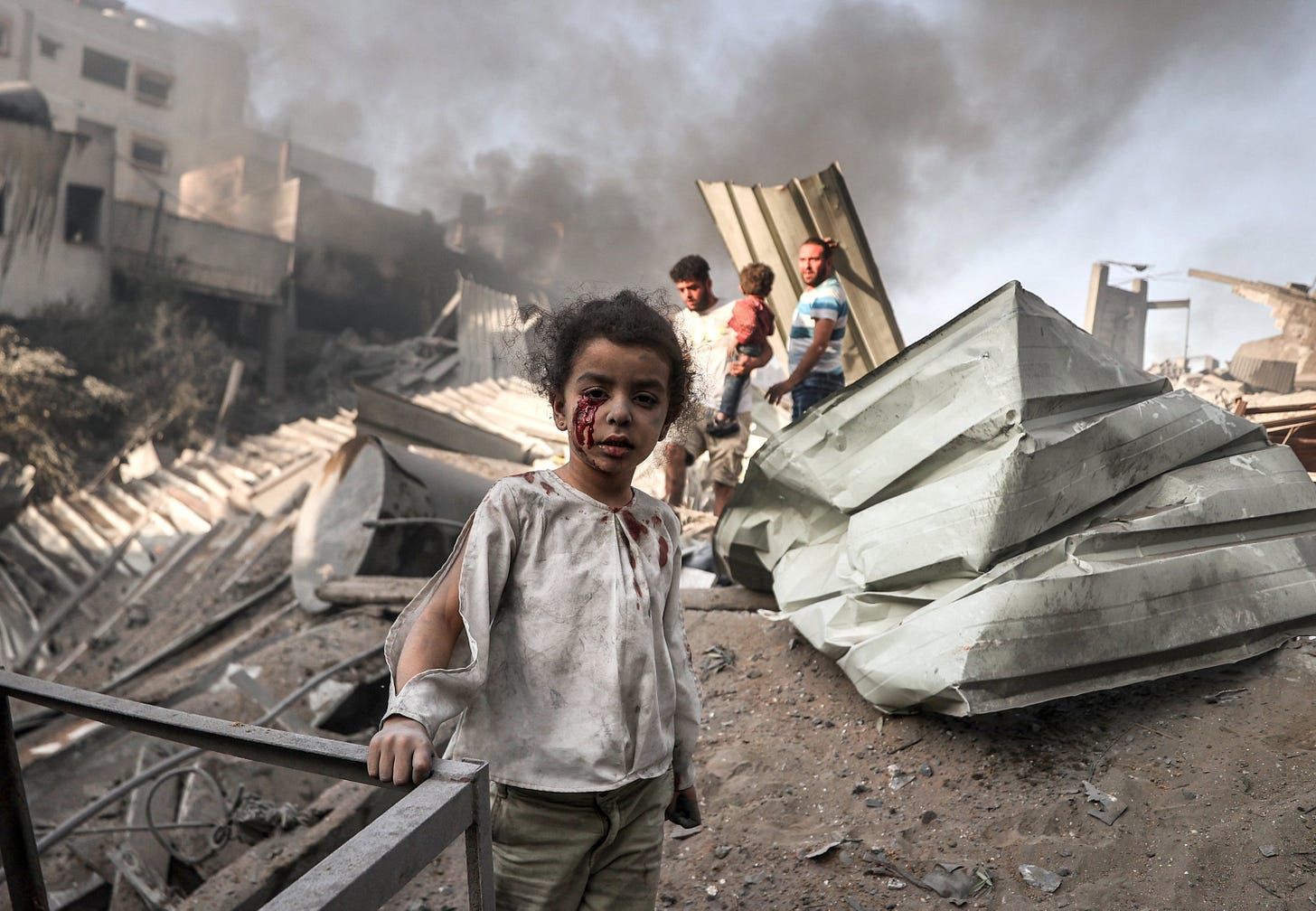Why Wasn't That Covered in American Media?
How America's most widely consumed news outlets write about Gaza.

Note: This will cut off in your email! Open in a browser to continue reading.
Late last year, between Christmas and New Year’s, South Africa accused Israel of intending to commit genocide. In January, both nations made oral arguments before an international war crimes tribunal founded after the Holocaust; Israel accused South Africa of committing “blood libel.” At the end of the month, the court ruled on a number of preliminary measures; it ordered Israel to take more steps to prevent any acts of genocide, but stopped short of ordering Israel to halt its military offensive. (This is the same judicial body that, earlier this month, issued an advisory ruling that Israel's occupation of Palestinian territories and settlements is not only unlawful, but “tantamount to the crime of apartheid”.)
Did you read much about the genocide case? (I’m not judging and don’t care what your answer is; in fact, I consider us friends.) If you did read about the case, did you see much written about the evidence South Africa presented? Because South Africa presented quite a breadth of empirical evidence that suggests Israel is not only acting with genocidal intent, but has been cultivating conditions, as the occupying force in Palestinian territories, that actually make it easier to commit genocide. (Nevermind the fact that Israel’s argument of self-defense in the Gaza war doesn’t hold legal water; violence from one party does not protect genocide or war crimes from another.)
If you didn’t read about the case or its evidence, you’re not alone, and I’d wager that more words were written about the evidence presented at Gwyneth Paltrow’s ski trial than the evidence presented at a genocide case in the Hague.
The U.S. has what’s been called “the most pro-Israel foreign policy in the world” (Vox). One symptom of that is a mainstream media landscape that features “few criticisms of Israeli policy” and “rarely questions Washington’s relationship with Israel” (Walt & Mearsheimer, Harvard Kennedy School, 2006). So, it’s for that reason that I’d like to publish some of the evidence presented in South Africa’s 84-page case that I think you should read. I’d also like to provide some context as to why neither of us read about that evidence in mainstream American media, which for years has been “marred by a deep-seated bias” in its coverage of Israel and Palestine (DAWN).
‘There is no point in denying this’
In allegations brought to the UN’s highest court, South Africa said Israel is violating the Genocide Convention, a United Nations treaty that “signified the international community’s commitment to ‘never again’” after World War II. Materially speaking, this doesn’t actually mean much. The impact of the ICJ’s final ruling will likely be more symbolic than anything else; the ICJ is a civil court that can’t directly enforce its rulings.
But the case against Israel is built on a stunning and diverse breadth of data, direct quotes and incriminating statements (more on those later) that attempt to prove that Israel is acting with “the intent to destroy a national, ethnic, racial, or religious group in whole or in part.”
(Key to remember: this case was published more than six months ago; since then, thousands more people have been killed and conditions have become even more apocalyptic. The Lancet, one of the world’s leading medical journals, estimated in July that the death toll in Gaza could exceed 180,000 Palestinians.)
— SIDEBAR —
Here are a few handy primers on the Israel-Palestine conflict:
Palestine, Israel and the Arab-Israeli Conflict (Middle East Research and Information Project)
Understanding the Palestinian-Israeli Conflict: A Primer (The Zinn Education Project)
Everything you need to know about Israel-Palestine (Vox)
Among the evidence South Africa’s case presented is a breakdown of why many of Israel’s evacuation directives are “not compatible with international humanitarian law” and purposefully impossible to follow. Important context: before Oct. 7, 80 percent of Palestinians in Gaza were refugees, expelled from towns and cities in what is now the state of Israel, the case states.
Palestinians in the West Bank are “subject to a harsh and arbitrary legal system quite unequal to that enjoyed by the Israeli settlers,” the case states, citing a separate UN report. The case also mentions a Sept. 2023 report from Save the Children, which declared 2023 the deadliest year for Palestinian children; 38 children had already been killed by Israeli occupying forces that year. Through Oct. 6, and among the wider population of Palestinians, Israeli soldiers had also killed 199 and injured 9,000 Palestinians in occupied territories, the case states.
Higher rates of bedwetting have been observed historically in Palestinian children compared to the general population, the case states. Since the war, at least 1,000 Palestinian children have lost one or both legs, per the case.
Also since the war started, sixty percent of Gaza’s housing stock has been destroyed; Israeli troops have “destroyed homes and laid to waste a significant amount of agricultural land,” leaving families to live in tents. The case cites a UN report that found Israeli troops destroying water wells near populated areas. “The Commission found it difficult to believe that such destruction, generally carried out in the middle of the night and without advance warning, was justified on grounds of military necessity,” it states.
Israel’s restriction of water in Gaza is “severely impacting lactating women, in particular … in parallel, the chronic unavailability of formula is also risking the lives of newborn babies, who are already reportedly dying from avoidable causes due to the absence of medical care, food, water and adequate sanitation. The impacts of malnourishment on older children may also be particularly grave and long-lasting, preventing them from reaching their full potential in terms of physical growth, cognitive capacity, school performance and productivity later in life.”
Gaza’s health care system “has all but collapsed … Israel has bombed, shelled and besieged Gaza’s hospitals,” the case states; any medical procedures that can still be performed — such as amputations and C-sections — are being performed without anesthetic. The case also cites reports of Israeli forces using white phosphorus in congested areas; “as the World Health Organization describes, even small amounts of white phosphorus can cause deep and severe burns, penetrating even through bone.”
“There are no functioning hospitals in the North of Gaza, in particular, such that injured persons are reduced to ‘waiting to die’, unable to seek surgery or medical treatment beyond first aid, dying slow, agonizing deaths from their injuries or from resultant infection,” the case states.
Raz Segal, an Israeli historian and professor who studies genocide, told Al Jazeera he was struck by “the mountain of evidence on genocidal intent that’s been expressed by people with command authority” in the case. “Rejecting this overwhelming evidence would be a complete mockery of international law,” Segal said.
“There is no point in denying this. It was a harsh day for the State of Israel in The Hague,” Nadav Eyal, a conservative Israeli commentator, wrote in Yedioth Ahronoth, an Israeli daily newspaper. “One of the harshest days, diplomatically, since the outbreak of the war.”
“Although the final judgment of the ICJ will likely take years, we hope the court will make a quick decision on a ceasefire. But this hope dulls when we realise that implementing the ruling depends on the Security Council, where the US can veto any resolution against Israel,” Fareed Taamallah, a Palestinian journalist, wrote for the Middle East Eye.
A media landscape with ‘few criticisms of Israeli policy’
In January, I’d read about the case a bit, but not much. But after I read through the evidence (one night, in an ill-advised 3 a.m. binge), it feels significant that I didn’t encounter any coverage of the evidence South Africa presented in mainstream U.S. media — specifically, in the seven outlets that represent the newspapers with the widest circulations, cable news networks with the largest viewerships and news websites with the largest readerships1 in the U.S.: The New York Times, The Washington Post, The New York Post, The Wall Street Journal, Fox News, MSNBC and CNN.
(I later looked through those publications’ archives for coverage of the specific evidence South Africa presented, and found none.)
Turns out, that’s not a bug of American media’s coverage of the war — it’s a feature. Coverage of Israel and Palestine across print, digital and broadcast news in the U.S. is often “more sympathetic toward the Israeli perspective than that of Palestinians” (The Conversation, 2024). Our pro-Israel lobby is “one of, if not the most, powerful international issue lobbies” in the nation (OpenSecrets.org) and “a powerful force in American politics” (The Guardian). As such, and in addition to many other factors, mainstream American media features “few criticisms of Israeli policy” and “rarely questions Washington’s relationship with Israel” (Walt & Mearsheimer).
Some of our media outlets are actually operating under directives that limit what they report on the war. For example, CNN’s Atlanta headquarters has set “strict guidelines” on coverage; one CNN staffer said “the majority of news since the war began … has been skewed by a systemic and institutional bias within the network toward Israel,” according to an investigation from The Guardian. At The New York Times, an internal memo was circulated in November that instructed reporters not to use the word Palestine “except in very rare cases,” and to avoid saying “occupied territory” to describe Palestine, per The Intercept.
Media bias can be nearly impossible to spot, in large part because it usually reinforces the biases that people in positions of power have already helped us develop. From a policy perspective, the default American viewpoint of what’s happening in Israel is, largely, not a genocide. But, also, our news media isn’t providing an accurate picture of what’s happening in Gaza. So what’s that viewpoint based on, really?
All this to say, I sifted through the archives of those seven aforementioned publications — The New York Times, The Washington Post, The New York Post, The Wall Street Journal, Fox News, MSNBC and CNN — and pulled three stories exhibiting what I found to be biased writing or reporting in each outlet’s coverage of the genocide case in January (more or less using these guidelines).
As someone who was trained in cars, so to speak, the idea is that maybe this’ll help you spot biased reporting, orrrrr that this is something you can send to friends who get their news from these outlets. Orrrr! Dare I say! You can send this to somebody who’s unconvinced that American media is favorably biased toward Israel. (If somebody sent you this, hi! Love the blouse.)
This is by no means anything comprehensive or authoritative — just some real-world examples of something that can feel a little abstract until you see it. OK, let’s dive in!
On Jan. 5, when The New York Times ran an op-ed that mentioned the case, the paper had so far only published a small news brief on the case; it pointed readers to more substantial coverage in The Guardian, a UK-based paper.
On Jan. 10, it published, “At World Court, Israel to Confront Accusations of Genocide.” The second paragraph described the hearings as “the first time that Israel has chosen to defend itself, in person, in such a setting, attesting to the gravity of the indictment and the high stakes for its international reputation and standing.” The third paragraph reads: “Genocide, the term first employed by a Polish lawyer of Jewish descent in 1944 to describe the Nazis’ systematic murder of about six million Jews and others based on their ethnicity, is among the most serious crimes of which a country can be accused.”
The sixth paragraph reads: “The allegation, which Israel categorically denies, is laden with a particular significance in Israel, a country founded in the wake of the near wholesale destruction of European Jewry and that soon after became a haven for Jews expelled by the hundreds of thousands from Arab lands.” Israeli officials are quoted in the eighth, ninth, 14th and 26th paragraphs; an Israeli pop star is quoted in the 13th paragraph, although not favorably.
One paragraph, the 30th, is given to the Palestinians. It reads: “In a statement, Hamas welcomed South Africa’s decision to bring the case, and called on “all countries to submit similar files and requests to competent national and international courts against this Nazi entity,” referring to Israel.”
The story is 35 paragraphs long.
On Jan. 11, it published “U.N.’s Top Court Hears Genocide Case Against Israel.” Netanyahu was quoted in the seventh paragraph; another Israeli official was quoted in the eighth and ninth paragraphs. South African lawyers are quoted in the twelfth, thirteenth and fourteenth paragraphs, no Palestinians are quoted in the story.
When CNN wrote a short brief on the case on Dec. 29, Israel’s response to the case was included in the fourth and fifth paragraphs. South Africa’s statement on the case is in the eleventh and twelfth paragraphs. No Palestinian officials are quoted in the story.
On Jan. 11, it published, “Israel is facing a genocide case in international court. Could it halt the war in Gaza?” In the second paragraph, the story says the case represents “the first time that the Jewish state is being tried under the UN’s Genocide Convention, which was drawn up after the Second World War in light of the atrocities committed against the Jewish people during the Holocaust.” The next paragraph describes South Africa as “a successor to the apartheid regime that was made a pariah on the international stage three decades ago.”
On Jan. 26, in “Top UN court says Israel must take ‘all measures’ to prevent genocide in Gaza but stops short of calling for ceasefire,” the story describes the court’s ruling as “a blow to Israel.” No Palestinians are quoted in the story.
Here’s everything I found that Fox News published on the case in January:
MSNBC only published one piece on the case in January: an opinion piece, “Why the ICJ didn’t rule on if Israel is committing genocide,” written by Hayes Brown, an opinion editor. (It felt neutral-ish?)
Here’s everything I found that The New York Post published on the case in January:
Israel faces genocide charges at World Court; Gazans return to wasteland
UN fires workers for Hamas terrorism as court rules against Israel: What a corrupt joke!
World Court says Israel must prevent genocide in Gaza, stops short of ceasefire order
UN court’s sick ‘genocide’ ruling shames the memory of 6 million Jews on Holocaust Remembrance Day
On Jan. 11, The Wall Street Journal published, “South Africa Accuses Israel of Genocide in U.N. Court.” Here’s the first sentence: “South Africa accused Israel of genocide before the International Court of Justice Thursday, contending that the Jewish state’s military response to Hamas attacks launched from Gaza violates the international treaty drafted in the aftermath of Nazi Germany’s systematic extermination of six million Jews.”
On Jan. 24, The Wall Street Journal’s Editorial Board published an op-ed, “Israel’s ‘Genocide’ Rebuttal,” and described Israel’s defense as “a window on the cynical campaign against Israel as it fights for survival.”
On Jan. 27, the paper’s Editorial Board published another op-ed, “The U.N.’s War on Israel,” and said an International Court of Justice’s ruling against Israel “dignified a blood libel.”
On Jan. 12, when South Africa presented its case before the International Court of Justice, the Post covered the news with this story: “Israel rejects genocide allegations at international court.” a story that featured Israel’s response to the genocide case in the first and third paragraphs, a quote from a legal adviser to the Israeli Ministry of Foreign Affairs in the fourth paragraph. South Africa’s lawyer is first quoted in the twelfth paragraph. The next three paragraphs are Israel’s rebuttals; no Palestinians are quoted in the story.
The Post published three columns in January on the case, two of which were supportive of Israel. On Jan. 15, the column “South Africa’s false charges of Israeli ‘genocide’ carry a heavy price” was published, opening with, “As Israel’s war against Hamas passed the 100-day mark, Israelis struggled to understand how their country could be accused of carrying out genocide in a war they did not start. If any party to the conflict is guilty of attempted genocide, it is Hamas.”
On Jan. 26, the Post published a column, “A top U.N. court’s ruling on Israel and Gaza is a perversion of justice,” which states that, “Hamas is responsible for the terrible scope of civilian casualties, having deliberately embedded itself within the civilian population in Gaza.” However, international humanitarian law protects civilians in occupied territories.
I’d like to close out by sharing one section (edited for length) of the case against Israel. It’s not a ton of hard data, and many of the people quoted here don’t wield real power. But it’s the section that sent the strongest chill in my stomach, which feels like valuable data to weigh when you’re choosing whether something’s worth sharing.
In a section titled “Expressions of Genocidal Intent against the Palestinian People by Israeli State Officials and Others,” South Africa presents dozens of remarks made on state television by some of Israel’s highest-ranking officials in its government and military leaders, as well as comments from Israeli Defense Forces soldiers. These remarks show officials speaking plainly about their intent to kill Palestinians, children and adults alike, with more than one official explicitly specifying that Palestinian “families, mothers and children” should be killed. High-ranking government ministers, cabinet members, army generals and soldiers frequently refer to Palestinians as “animals,” and Israel’s Minister of Heritage described the “flattened” Gaza Strip as “more beautiful than ever.”
“Those statements of intent — when combined with the level of killing, maiming, displacement and destruction on the ground, together with the siege — evidence an unfolding and continuing genocide,” the filing reads.
Here are some of those statements.
“Expressions of Genocidal Intent against the Palestinian People by Israeli State Officials and Others,”
from “Application of the Convention on the Prevention and Punishment of the Crime of Genocide in the Gaza Strip (South Africa v. Israel).
**********************************************************************
“There should be one sentence for everyone there — death.” -Yitzhak Kroizer, non-cabinet Knesset member, in an interview with a Galey Israel, Nov. 5, 2023
“No electricity, no food, no water, no fuel. Everything is closed. We are fighting human animals and we are acting accordingly.” -Defence Minister Yoav Gallant, in a statement, Oct. 9, 2023
“Israel has no interest in the Gaza Strip being rehabilitated and this is an important point that needs to be made clear to the Americans.” -Giora Eiland, Israeli Army Reservist Major General and former Head of the Israeli National Security Council, in an interview with local media, Nov. 17, 2023
“Gaza won’t return to what it was before. We will eliminate everything. If it doesn’t take one day, it will take a week. It will take weeks or even months, we will reach all places.” -Defence Minister Yoav Gallant, in a statement, Oct. 9, 2023
“It’s an entire nation out there that is responsible. It’s not true, this rhetoric about civilians not aware, not involved. It’s absolutely not true. ... and we will fight until we break their backbone.” -President Isaac Herzog, press conference to foreign media, Oct. 12, 2023
“This is the war between the sons of light and the sons of darkness. We will not let up on our mission until the light overcomes the darkness.” -Prime Minster Benjamin Netanyahu, on Twitter, Nov. 3, 2023
“To be clear, when we say that Hamas should be destroyed, it also means those who celebrate, those who support, and those who hand out candy — they’re all terrorists, and they should also be destroyed.” -Itamar Ben-Gvir, Minister of National Security of Israel, in a televised address, Nov. 10, 2023
“Humanitarian aid to Gaza? No electrical switch will be turned on, no water hydrant will be opened and no fuel truck will enter … And no one will preach us morality.” -Israel Katz, minister of foreign affairs, on Twitter, Oct. 12, 2023
“We need to deal a blow that hasn’t been seen in 50 years and take down Gaza.” -Bezalel Smotrich, in a meeting of the Israeli Cabinet, Oct. 8 2023
“The north of the Gaza Strip, more beautiful than ever. Everything is blown up and flattened, simply a pleasure for the eye. … There is no such thing as uninvolved civilians in Gaza.” -Amichai Eliyahu, Israeli Minister of Heritage, on Facebook, Nov. 1, 2023
“Now we all have one common goal — erasing the Gaza Strip from the face of the earth.” -Nissim Vatur, Deputy Speaker of the Knesset and Member of the Foreign Affairs and Security Committee, on Twitter, Oct. 7, 2023
“Human animals are dealt with accordingly. Israel has imposed a total blockade on Gaza, no electricity, no water, just damage. You wanted hell, you will get hell.” -Ghassan Alian, Israeli Army Coordinator of Government Activities in the Territories, in a video address to Gazans and Hamas, Oct. 9, 2023
“They will not receive a drop of water or a single battery until they leave the world.” -Israel Katz, minister of foreign affairs, on Twitter, Oct. 13, 2023
“(Water in Gaza) comes from wells with salt water unfit for consumption. They have water treatment plants — Israel should hit those plants. When the entire world says we have gone insane and this is a humanitarian disaster, we will say, ‘It’s not an end, it’s a means.’” -Eiland, again, in an online essay, Oct. 9, 2023
“May their village burn, May Gaza be erased!” -IDF soldiers, filmed in Gaza, Dec. 5, 2023
“We know our motto: there are no uninvolved civilians!” -IDF soldiers, filmed in Gaza, Dec. 7, 2023
“There is no population. There are 2.5 million terrorists.” -Eliyahu Yossian, analyst and commentator, in an interview with local media, Oct. 29, 2023
“The children of Gaza have brought this upon themselves.” -Meirav Ben-Ari, non-cabinet member of the Israeli Knesset (Legislature), on Facebook, Oct. 16, 2023

According to Press Gazette, a UK-based trade publication covering the media industry.











